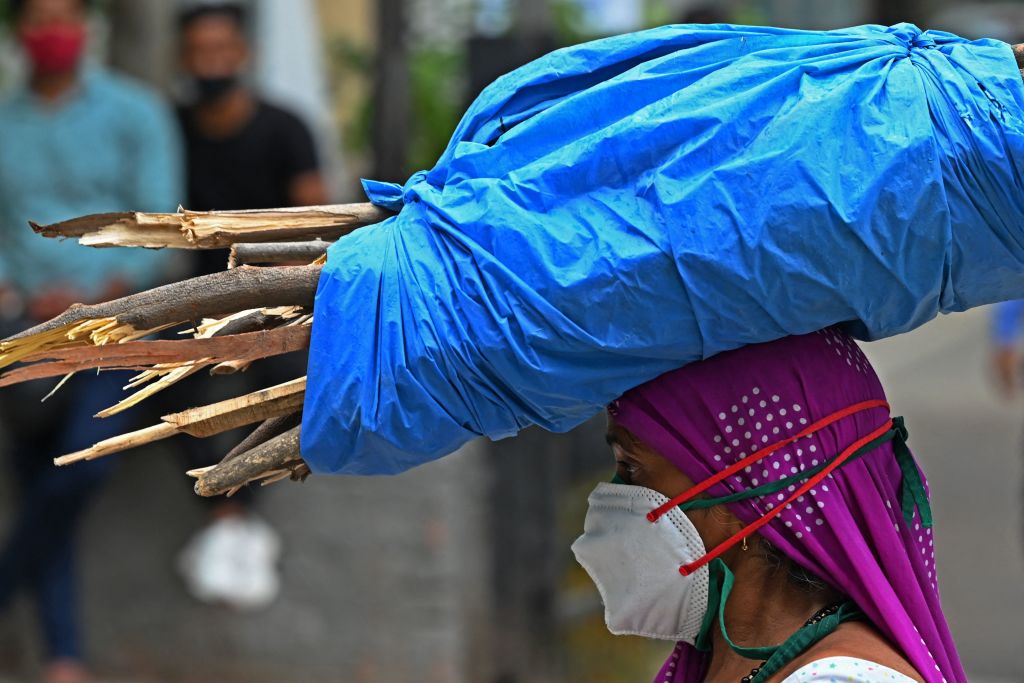Without oxygen, several people die in hospital in India 3:32
(CNN Spanish) -
The variant of covid-19 detected for the first time in India, B.1.617, has now gone global.
The WHO classified B.1.617 and its sublineages as a "variant of concern" on 10 May.
That classification means that a variant may be more communicable or cause more severe disease, not respond to treatment, evade the immune response, or go undiagnosed.
by standard tests.
B.1.617 was the fourth strain to be declared a "variant of concern" by the WHO;
the others are B.1.1.7, which was first seen in the UK;
B.1.351, first detected in South Africa;
and P.1, found for the first time in Brazil.
Here's what you need to know about variant B.1.617 first identified in India.
What is the covid-19 variant that was identified in India?
Simply put, variant B.1.617 is a transformation of the SARS-CoV-2 virus that causes covid-19 disease.
It is normal for viruses to change.
And they do this through mutations, according to the US Centers for Disease Control and Prevention (CDC).
advertising
“Viruses are constantly changing through mutation, and new variants of the virus are expected to appear over time.
Sometimes new variants emerge and then disappear.
At other times, new variants emerge and persist, "the CDC explains.
At the beginning, variant B.1.617 was called a “double mutant”, although this is not entirely correct, since mutations are characteristic of variants.
In fact, several of them have dozens of mutations.
Mutations of the variant identified in India
Crisis in India: devastating scenes in rural areas 3:29
In this sense, there are two mutations identified in variant B.1.617: L452R and E484Q.
The L452R mutation is also found in variants B.1.427 and B.1.429 first detected in California, which have some degree of immunological resistance.
The E484Q mutation is probably similar to another mutation called E484K, which is associated with the B.1.351 variant first detected in South Africa.
When was it found?
Variant B.1.617 was first detected in India in December 2020.
However, this variant was only reported on March 24, after the Indian Ministry of Health said that the L452R and E484Q mutations had not been detected before December in sample analysis.
“These mutations give the virus an immunological escape and a greater contagion capacity.
They have been found in around 15-20% of the samples and do not coincide with any variant previously classified as of concern ”, detailed the Indian agency in a statement.
Is it more contagious?
The WHO said that B.1.617 showed signs of being potentially more transmissible than some other strains of the virus, but cautioned that more research is required.
Although Indian officials say the variant is driving India's crippling second wave, the WHO has said that several other contributing factors, such as mass gatherings, have likely contributed to the spread there as well.
The UK, which has world-class virus sequencing capabilities, cautioned that B.1.617.2, a subtype of the variant first found in India, would likely outperform others, such as B.1.1.7, highly. Communicable first identified in the UK last year, to become the most dominant variant of the virus in the country.
«What has changed is the very clear vision now that everyone has looked at it, that [B.1.617.2] is more transmissible than B.1.1.7 and we hope, over time, that this variant will outperform and come to dominate in the UK, in the way B.1.1.7 took over and indeed other variants have taken over before that, 'England's chief medical officer Professor Chris Whitty said on Friday.
Encouraging preliminary data on the scope of vaccines against the new variant
Is it more deadly?
So far, there is no evidence that B.1.617 is causing more serious disease.
"Currently, there is insufficient evidence to indicate that any of the variants recently detected in India cause more serious disease," Public Health England said on 7 May.
Do vaccines work against it?
Laboratory research on the efficacy of Pfizer and Moderna vaccines against the variants first seen in India showed that the injections appear to protect against the variants.
The findings were reported in a pre-printed article on biorxiv.org on Sunday, which has yet to be peer-reviewed.
The new research involved serum samples collected from eight people who had recovered from COVID-19, six people fully vaccinated with the Pfizer vaccine, and three people fully vaccinated with Moderna.
The researchers analyzed in a laboratory experiment how serum samples neutralized lentiviruses, a type of retrovirus, equipped with the same mutations as the coronavirus variants B.1.617 and B.1.618.
Variants of interest and worrying variants of covid-19: this is what we know
They found some decreases in neutralization, but overall, antibodies from people who had been vaccinated appeared to function "well above" the serum of people who had recovered from COVID-19 caused by earlier versions of the coronavirus.
More research is needed to determine how effective vaccines are against those variants in the real world, they said.
Their findings appear to confirm what Oxford University researchers are seeing in the first real-life data, which gives "a degree of confidence" that the vaccines work against the variants, the secretary of UK health, Matt Hancock.
He echoed other scientists who have been cautiously optimistic about the efficacy of vaccines.
Sir John Bell, emeritus professor of medicine at Oxford, told Times Radio that early laboratory results suggest that the B.1.617.2 variant "will be susceptible to the vaccine in the same way as others."
While the variant is now the dominant strain in some parts of the UK, Hancock said that 'the people who end up in hospital are mostly people eligible for the vaccine but who have not had the vaccine'.
Whitty, England's chief medical officer, said on May 6 that the variants first identified in India likely fall in the middle in terms of danger between B.1.1.7, which appears almost completely susceptible to vaccines and treatments, and B.1.351, which has been documented to infect people who have recovered from infection with previous variants of the coronavirus, and also to partly evade the protection offered by vaccines.
Which countries have detected the variant?
The variant has been identified in 44 countries, on every continent except Antarctica, according to the WHO.
The UK has reported the highest number of cases of the strain outside of India, he said.
Meanwhile, in the United States, where B.1.617 is also present, the Centers for Disease Control and Prevention (CDC) still classifies it as a "variant of interest," but noted that this classification could change, based on evidence. scientific.
Spain confirmed its first four cases of the variant detected in India in early May.
Of these infections, three have been registered in the Galician city of Vigo and correspond to crew members of a cargo ship that is docked and quarantined in the port of the city.
The fourth case was notified by the Junta de Extremadura.
For their part, the Mexican authorities reported that it was detected for the first time in the state of San Luis Potosí, in the north-central region of the country.
France, Israel and Malaysia have also identified cases.
Meanwhile, several countries have imposed travel restrictions: Nepal suspended flights from India;
Hong Kong extended the country's passenger flight bans;
Thailand imposed a 21-day isolation for passengers from India.
Biden Announces US Will Share More Covid-19 Vaccines With Countries Around The World
What does it mean for global roadmaps coming out of lockdown?
If India's coronavirus outbreak cannot be contained and continues to spread to neighboring countries with low vaccine supplies and weak health systems, experts warn that the world is at risk of replaying scenes witnessed in India.
The outbreak there has already had an impact on the global supply of vaccines.
India is a leading manufacturer of vaccines, but when cases began to increase, its government restricted the export of covid-19 vaccines.
And the more the virus spreads, the more chance it has to mutate and create new variants that could eventually resist current vaccines, threatening to undermine other countries' progress in containing the pandemic.
With information from CNN's Sheena McKenzie, Maggie Fox, Kara Fox, Ivana Kottasová, Robert Iddiols, Aditi Sangal, Uriel Blanco, Aditi Sangal and Juan Carlos López.
Covid-19 Variant















